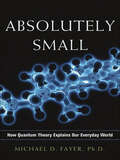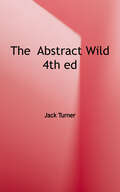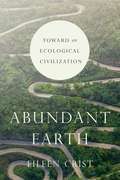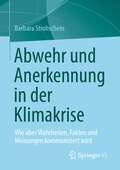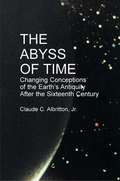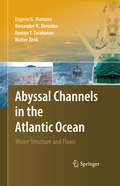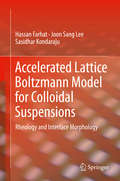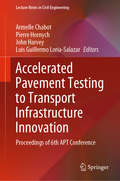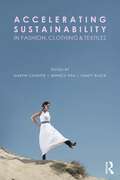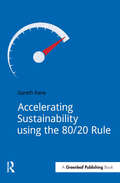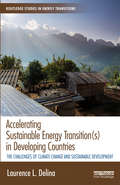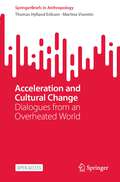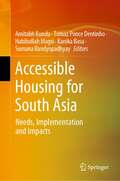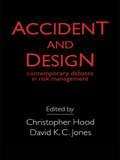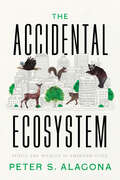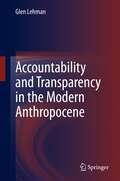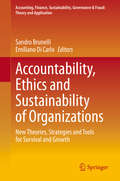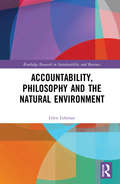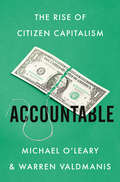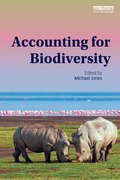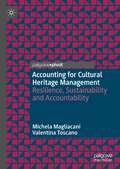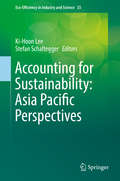- Table View
- List View
Absolutely Small: How Quantum Theory Explains Our Everyday World
by Michael D. FayerAbsolutely Small presents (and demystifies) the world of quantum science like no book before.Physics is a complex, daunting topic, but it is also deeply satisfying?even thrilling. When liberated from its mathematical underpinnings, physics suddenly becomes accessible to anyone with the curiosity and imagination to explore its beauty. Science without math? It&’s not that unusual.For example, we can understand the concept of gravity without solving a single equation. So for all those who may have pondered what makes blueberries blue and strawberries red; for those who have wondered if sound really travels in waves; and why light behaves so differently from any other phenomenon in the universe, it&’s all a matter of quantum physics.This book explores in considerable depth scientific concepts using examples from everyday life, such as:particles of light,probability,states of matter,what makes greenhouse gases badChallenging without being intimidating, accessible but not condescending, Absolutely Small develops your intuition for the very nature of things at their most basic and intriguing levels.
The Abstract Wild
by Jack TurnerIf anything is endangered in America it is our experience of wild nature—gross contact. There is knowledge only the wild can give us, knowledge specific to it, knowledge specific to the experience of it. These are its gifts to us. <p><p>How wild is wilderness and how wild are our experiences in it, asks Jack Turner in the pages of The Abstract Wild. His answer: not very wild. National parks and even so-called wilderness areas fall far short of offering the primal, mystic connection possible in wild places. And this is so, Turner avows, because any managed land, never mind what it's called, ceases to be wild. Moreover, what little wildness we have left is fast being destroyed by the very systems designed to preserve it. <p><p>Natural resource managers, conservation biologists, environmental economists, park rangers, zoo directors, and environmental activists: Turner's new book takes aim at these and all others who labor in the name of preservation. He argues for a new conservation ethic that focuses less on preserving things and more on preserving process and "leaving things be." He takes off after zoos and wilderness tourism with a vengeance, and he cautions us to resist language that calls a tree "a resource" and wilderness "a management unit." <p><p>Eloquent and fast-paced, The Abstract Wild takes a long view to ask whether ecosystem management isn't "a bit of a sham" and the control of grizzlies and wolves "at best a travesty." Next, the author might bring his readers up-close for a look at pelicans, mountain lions, or Shamu the whale. From whatever angle, Turner stirs into his arguments the words of dozens of other American writers including Thoreau, Hemingway, Faulkner, and environmentalist Doug Peacock. We hunger for a kind of experience deep enough to change our selves, our form of life, writes Turner. Readers who take his words to heart will find, if not their selves, their perspectives on the natural world recast in ways that are hard to ignore and harder to forget.
Abundant Earth: Toward an Ecological Civilization
by Eileen CristIn Abundant Earth, Eileen Crist not only documents the rising tide of biodiversity loss, but also lays out the drivers of this wholesale destruction and how we can push past them. Looking beyond the familiar litany of causes—a large and growing human population, rising livestock numbers, expanding economies and international trade, and spreading infrastructures and incursions upon wildlands—she asks the key question: if we know human expansionism is to blame for this ecological crisis, why are we not taking the needed steps to halt our expansionism? Crist argues that to do so would require a two-pronged approach. Scaling down calls upon us to lower the global human population while working within a human-rights framework, to deindustrialize food production, and to localize economies and contract global trade. Pulling back calls upon us to free, restore, reconnect, and rewild vast terrestrial and marine ecosystems. However, the pervasive worldview of human supremacy—the conviction that humans are superior to all other life-forms and entitled to use these life-forms and their habitats—normalizes and promotes humanity’s ongoing expansion, undermining our ability to enact these linked strategies and preempt the mounting suffering and dislocation of both humans and nonhumans. Abundant Earth urges us to confront the reality that humanity will not advance by entrenching its domination over the biosphere. On the contrary, we will stagnate in the identity of nature-colonizer and decline into conflict as we vie for natural resources. Instead, we must chart another course, choosing to live in fellowship within the vibrant ecologies of our wild and domestic cohorts, and enfolding human inhabitation within the rich expanse of a biodiverse, living planet.
Abwehr und Anerkennung in der Klimakrise: Wie über Wahrheiten, Fakten und Meinungen kommuniziert wird
by Barbara StrohscheinAuf Wahrheiten, Fakten und Meinungen zur Klimafrage wird häufig öffentlich wie privat mit psychischer oder sozialer Abwehr reagiert. Gestützt auf ausgewählte psychologische und philosophische Theorien sowie Datenmaterial wird in diesem Buch gezeigt, wie Abwehr zustande kommt, wie sie wirkt und wie andererseits die notwendige Anerkennung auf verschiedenen Ebenen gelingen kann. Erst durch Anerkennung werden konstruktive Diskurse möglich. Dieses Buch bietet alle Grundlagen, um Kommunikationskonflikte zwischen Abwehr und Anerkennung in der Klimakrise theoretisch und praktisch lösen zu können.
The Abyss of Time: Unraveling the Mystery of the Earth's Age (Dover Earth Science)
by Claude C. AlbrittonAccessible, entertaining work addresses Earth's age as it explores the work of Hooke, Buffon, Lyell, Cuvier, Darwin, Agassiz, and others, detailing discoveries that led to knowledge of Earth's astonishing antiquity -- from Steno's contemplation of fossilized shark's teeth in 1666 through Holmes' time scales of 1960. Nominated for the American Book Award. 29 black-and-white illustrations.
Abyssal Channels in the Atlantic Ocean: Water Structure and Flows
by Alexander N. Demidov Eugene G. Morozov Roman Y. Tarakanov Walter ZenkThis book is dedicated to the study of structure and transport of deep and bottom waters through underwater channels of the Atlantic Ocean. The study is based on recent observations, analysis of historical data, and literature review. A strong flow of Antarctic Bottom Water from the Argentine Basin to the Brazil Basin through the Vema Channel (32 -27 S) is studied on the basis of CTD sections combined with LADCP profiling carried out annually and long-term moored measurements. The flow in the Vema Channel is mixed in the vertical direction but horizontally stratified. The mean speed of the flow is 30 cm/s and water transport is approximately 3.5 Sv. Owing to the bottom Ekman friction the dense core of the flow is usually displaced to the eastern wall of the channel. A temperature increase was found in the deep Vema Channel, which has been observed for 30 years already. The further flow of bottom water in the Brazil Basin splits in the northern part of the basin. Part of water flows to the East Atlantic basins through the Romanche and Chain fracture zones. The other part is a northwestern flow to the North American Basin. Part of the northwesterly flow propagates through the Vema Fracture Zone (11 N) into the Northeastern Atlantic basins. Flows in the Romanche, Chain, and Vema fracture zones were studied recently by CTD and LADCP profiling. An underwater cataract was found in the Chain Fracture Zone. Recent measurements in the Kane Gap show that the flow of bottom water there is characterized by alternative transport in time. The Northeastern Atlantic basins are filled with the bottom water flowing through the Vema Fracture Zone. The flows of bottom waters through the Romanche and Chain fracture zones do not spread to the Northeast Atlantic due to strong mixing in the equatorial zone and enhanced transformation of bottom water properties. Extra material: The CTD data sets collected in abyssal channels of the Atlantic Ocean can be downloaded from http://extras.springer.com. The access to the data is organized either by means of a clickable map or tables. Investigators can download individual casts organized by the year of the experiment or its location. The CTD data are organized in the form of a heading and three columns (pressure, temperature, salinity). The style is similar to the WOCE format. A line with coordinates is added to the heading.
Accelerated Lattice Boltzmann Model for Colloidal Suspensions: Rheology and Interface Morphology
by Hassan Farhat Joon Sang Lee Sasidhar KondarajuColloids are ubiquitous in the food, medical, cosmetics, polymers, water purification, and pharmaceutical industries. The thermal, mechanical, and storage properties of colloids are highly dependent on their interface morphology and their rheological behavior. Numerical methods provide a convenient and reliable tool for the study of colloids. Accelerated Lattice Boltzmann Model for Colloidal Suspensions introduce the main building-blocks for an improved lattice Boltzmann-based numerical tool designed for the study of colloidal rheology and interface morphology. This book also covers the migrating multi-block used to simulate single component, multi-component, multiphase, and single component multiphase flows and their validation by experimental, numerical, and analytical solutions. Among other topics discussed are the hybrid lattice Boltzmann method (LBM) for surfactant-covered droplets; biological suspensions such as blood; used in conjunction with the suppression of coalescence for investigating the rheology of colloids and microvasculature blood flow. The presented LBM model provides a flexible numerical platform consisting of various modules that could be used separately or in combination for the study of a variety of colloids and biological flow deformation problems.
Accelerated Pavement Testing to Transport Infrastructure Innovation: Proceedings of 6th APT Conference (Lecture Notes in Civil Engineering #96)
by Armelle Chabot Pierre Hornych John Harvey Luis Guillermo Loria-SalazarThis volume gathers the latest advances, innovations, and applications in the field of accelerated pavement testing (APT), presented at the 6th International Conference on Accelerated Pavement Testing, in Nantes, France, on September 27-29, 2021. Discussing APT, which involves rapid testing of full-scale pavement constructions for structural deterioration, the book covers topics such as APT facilities, APT of asphalt concrete and sustainable/innovative materials, APT for airfield pavements, testing of maintenance and rehabilitation solutions, testing of smart and multi-functional pavements, data analysis and modeling, monitoring and non-destructive testing, and efficient means of calibrating/developing pavement design methods. Featuring peer-reviewed contributions by leading international researchers and engineers, the book is a timely and highly relevant resource for materials scientists and engineers interested in determining the performance of pavement structures during their service life (10+ years) in a few weeks or months.
Accelerating Sustainability in Fashion, Clothing and Textiles
by Martin Charter Bernice Pan Sandy BlackThe issue of sustainability is characterised as a ‘wicked problem’ in the fashion, clothing and textiles sector and is now coming into increased focus due to growing consumer, business and policy pressures. This in-depth volume presents a comprehensive overview of the challenges and emerging opportunities faced by the sector, and provides strategic solutions as to how the sector can substantially accelerate sustainability. This book collates research and industry best practice to provide a ‘one-stop shop’ exploring the complex and interconnected issues surrounding sustainability in fashion, clothing and textiles. The practical and digestible chapters include innovative examples and perspectives from different regions of the globe, addressing topics from policies to supply chain issues and materials innovation. Five unique case studies of sustainable businesses provide detailed examples of pioneering practice. Edited by three professionals with long-standing knowledge and expertise, the book takes a global perspective with examples that illustrate the scale and breadth of topics and regions in the scope of sustainability. This holistic approach brings together both academic and industry perspectives on the critical areas that require immediate action to move towards a more sustainable fashion, clothing and textile sector. This is an invaluable resource for those working in the industry, policymakers and for those in business or academia with an interest in sustainability in fashion, clothing, textiles and related sectors worldwide. It is also relevant to professionals and students in the areas of sustainability, innovation, supply chains, design and development, consultancy, education and training.
Accelerating Sustainability Using the 80/20 Rule
by Gareth KaneAre your sustainability efforts making as much impact as they could be?With our collective way of life rubbing up against the natural limits of the planet, it does not take a genius to see that it is time to scrape the mud off our boots and find a shorter, smarter path towards sustainability – a way to maximize our effectiveness and inspire leaps forward in sustainability, rather than incremental steps. The 80/20 rule says that, in many situations, a small number of inputs determine the vast majority of our desired results. If we identify these “vital few” inputs in our sustainability efforts, and focus on them, we can maximize our effectiveness and accelerate progress rapidly. This book will help you to think about sustainability from an 80/20 perspective with practical applications for: product and service development; supply chains; materiality, indicators and quantitative analysis; waste, energy efficiency, water conservation and transport; employee engagement and sustainability strategy. If you want to focus on what works, deliver better results, waste less time on “switch it off” stickers and ineffective “standard practice” and start making a real difference, then this book is for you!
Accelerating Sustainable Energy Transition: The challenges of climate change and sustainable development (Routledge Studies in Energy Transitions)
by Laurence L DelinaAccelerating sustainable energy transitions away from carbon-based fuel sources needs to be high on the agendas of developing countries. It is key in achieving their climate mitigation promises and sustainable energy development objectives. To bring about rapid transitions, simultaneous turns are imperative in hardware deployment, policy improvements, financing innovation, and institutional strengthening. These systematic turns, however, incur tensions when considering the multiple options available and the disruptions of entrenched power across pockets of transition innovations. These heterogeneous contradictions and their trade-offs, and uncertainties and risks have to be systematically recognized, understood, and weighed when making decisions. This book explores how the transitions occur in fourteen developing countries and broadly surveys their technological, policy, financing, and institutional capacities in response to the three key aspects of energy transitions: achieving universal energy access, harvesting energy efficiency, and deploying renewable energy. The book shows how fragmented these approaches are, how they occur across multiple levels of governance, and how policy, financing, and institutional turns could occur in these complex settings. This book will be of interest to students and scholars of energy and climate policy, development studies, international relations, politics, strategic studies, and geography. It is also useful to policymakers and development practitioners.
Acceleration and Cultural Change: Dialogues from an Overheated World (SpringerBriefs in Anthropology)
by Thomas Hylland Eriksen Martina VisentinThis open access book includes socio-anthropological and anthropo-sociological conversations between one of the world’s leading anthropologists, Thomas Hyland Eriksen, and a young scholar, using his groundbreaking "overheating" approach.This book includes socio-anthropological and anthropo-sociological conversations between one of the world’s leading anthropologists, Thomas Hyland Eriksen, and a young scholar, using his groundbreaking "overheating" approach. From the pandemic to the spread of nationalism, from the Anthropocene to the Homogenocene, the authors discuss the most urgent issues of current society: e.g., the loss of biological and cultural diversity owing to the forces of globalisation; and the emergence of new forms of diversity through globalisation and migration; the intersectional dimension of climate change; the incredible rising of anger demonstrations around the world and resentful, overheated identities often linked to right-wing nationalism; the way digital devices have changed the meaning of temporality in people's life-worlds; the regulatory and competitive pressures on universities which are a result of many factors in the intersection of globalisation, massification and marketisation; youth's weakened belief in progress connected to changes in the contemporary world, such as growing inequality, political alienation and environmental destruction; recent pathbreaking research and original theory in sociology and anthropology related to the changes in an overheated world; and what post-Coronavirus social life might become. Highly topical, engaging and written in a conversational style, this book is a must-read for social scientists and discerning lay persons who want a fresh perspective on understanding the critical issues of our time. This is an open access book.
Accessible Housing for South Asia: Needs, Implementation and Impacts
by Amitabh Kundu Tomaz Ponce Dentinho Habibullah Magsi Kanika Basu Sumana BandyopadhyayThis book deals with important issues related to urban housing in South Asia. It analyses various aspects of housing, including spatial and temporal requirements and needs, as well as the challenges of implementing housing projects, such as financial feasibility of estate development projects and housing design. Finally, it discusses the socio-economic and environmental impacts of the rapid urban housing development in South Asia. Written by experts from various disciplines, the book presents several case studies that address issues such as housing provision; legislative, financial and technical support; access to employment opportunities and markets; the cumulative impact on gentrification; exclusion and spatial equity; and the economic, social and environmental sustainability of urban tissue. Researchers, housing planners, and policy makers will find this book a valuable resource in meeting the demand for affordable and sustainable housing and overcoming housing shortages in developing countries
Accident And Design: Contemporary Debates On Risk Management
by Christopher Hood David K. C. JonesAn examination of different theoretical, methodological and practical approaches towards the management of risk. Seven dimensions of the debate are identified, and the case for each position is put forward, the whole discussion being set in context and perspective. This volume attempts to identify and juxtapose the contested doctrines and underlying assumptions in the field of risk management.
The Accidental Ecosystem: People and Wildlife in American Cities
by Peter S. AlagonaWith wildlife thriving in cities, we have the opportunity to create vibrant urban ecosystems that serve both people and animals.The Accidental Ecosystem tells the story of how cities across the United States went from having little wildlife to filling, dramatically and unexpectedly, with wild creatures. Today, many of these cities have more large and charismatic wild animals living in them than at any time in at least the past 150 years. Why have so many cities—the most artificial and human-dominated of all Earth’s ecosystems—grown rich with wildlife, even as wildlife has declined in most of the rest of the world? And what does this paradox mean for people, wildlife, and nature on our increasingly urban planet? The Accidental Ecosystem is the first book to explain this phenomenon from a deep historical perspective, and its focus includes a broad range of species and cities. Cities covered include New York City, Los Angeles, San Francisco, Pittsburgh, Austin, Miami, Chicago, Seattle, San Diego, Atlanta, Philadelphia, and Baltimore. Digging into the natural history of cities and unpacking our conception of what it means to be wild, this book provides fascinating context for why animals are thriving more in cities than outside of them. Author Peter S. Alagona argues that the proliferation of animals in cities is largely the unintended result of human decisions that were made for reasons having little to do with the wild creatures themselves. Considering what it means to live in diverse, multispecies communities and exploring how human and non-human members of communities might thrive together, Alagona goes beyond the tension between those who embrace the surge in urban wildlife and those who think of animals as invasive or as public safety hazards. The Accidental Ecosystem calls on readers to reimagine interspecies coexistence in shared habitats, as well as policies that are based on just, humane, and sustainable approaches.
Accidental Wilderness: The Origins and Ecology of Toronto’s Tommy Thompson Park
by Walter H. KehmOnce referred to as Toronto’s “accidental wilderness,” Tommy Thompson Park is now recognized as a fortuitous urban miracle. Initially created as a landfill site on the city’s rapidly developing waterfront, the park’s physical and ecological footprint have grown dramatically. Forests, grasslands, and wildlife now thrive – all within a stone’s throw of some of the most densely populated areas of North America’s fourth-largest city. Accidental Wilderness is a rich and lyrical collection of essays curated by internationally recognized landscape architect and original designer of Tommy Thompson Park, Walter H. Kehm, complemented by a stunning collection of photographs by renowned landscape photographer Robert Burley. The book explores the city’s port origins; the park’s master plan principles and design; the native-plant succession process; the park’s unique flora and fauna; public advocacy; and public recreation in the park and its effect on mental, physical, and spiritual health. In an era where the looming dangers associated with climate change affect our daily lives, Tommy Thompson Park offers a hopeful narrative about how nature can flourish in, and contribute to, the well-being of twenty-first-century cities.
Accomplishing Climate Governance
by Harriet BulkeleyThis book provides a new approach to thinking about the politics and geographies of climate governance. It argues that in order to understand the nature and potential of the range of new responses to climate change emerging at multiple scales we need to examine how governance is accomplished - how it is undertaken, practised and contested. Through a range of case studies drawn from communities, corporations and local government, the book examines how climate change comes to be governed and made to matter as an issue with which diverse publics should be concerned. It concludes that rather than seeking the solution to climate change once and for all, we need to engage with the ways in which we can channel our intentions to ameliorate the climate problem to more progressive ends. The book will be of interest to researchers, advanced students and policy makers across the social sciences.
Accountability and Transparency in the Modern Anthropocene
by Glen LehmanThe book is about accountability processes and how they contribute solutions to our current environmental and global political problems. This book is different to other literature in this field. This is so because the dominant accountability discourse is shaped by what is defined as a neoliberal business case for social and environmental reform. This book assumes a nirvana stance within globalisation where all citizens operate within the parameters of the free market and will recover from adverse economic and political damage. Further this book uses neoliberalism and free-market reforms aims as examples to implement efficient management technologies and create more competitive pressures. Central to the argument of the book are perspectives on authenticity, expressivism and interpretivism which are found to provide a radical reworking of our understanding of being in the world. These frameworks offer a starting point for rethinking the way individuals, businesses and communities ought to be dealing politically with accountability and ecological crises. The argument builds to an accountability perspective that utilises work from expressivism, interpretivism, classical liberalism and postmodern theory. The theoretical quest undertaken in this book is to develop connections between accountability, democratic, ethical and ecological perspectives.
Accountability, Ethics and Sustainability of Organizations: New Theories, Strategies and Tools for Survival and Growth (Accounting, Finance, Sustainability, Governance & Fraud: Theory and Application)
by Sandro Brunelli Emiliano Di CarloThis book explains how the traditional paradigm of private and public organizations is changing as a result of the multiple factors that are affecting the way in which goods and services are produced, and for whom they are produced. In view of these disruptive trends, the theory of the firm needs to be updated and to some extent rethought. Moreover, diverse challenges and opportunities such as climate change, aging populations, and new public accountability requirements are necessitating novel frameworks to ensure the long-term survival of public and private organizations. Against this backdrop, the authors contribute to the debate over the firm’s primary interest by proposing a new way of viewing the nature of the firm and its relationship with stakeholders. In addition, they carefully analyze the challenges and opportunities mentioned above, evaluating their significance for various important aspects of organizations through different lenses. Global in scope, the book also takes the United Nations Sustainability Development Goals into account. Accordingly, it will be of interest to all readers seeking a better understanding of the evolving nature of firms and organizations in our changing world.
Accountability, Philosophy and the Natural Environment (Routledge Research in Sustainability and Business)
by Glen LehmanUsing a philosophical and interdisciplinary approach, this book looks at how accountability can provide solutions to our current environmental and global political problems. When a social system has external elements imposed upon it, or presented to it, political problems are likely to emerge. This book demonstrates that what is needed are connecting social elements with a natural affinity to bring people together despite their differences. This book is different from others in the field. It provides new insights by critiquing the extant understandings of accountability and expands the possibilities by building on Charles Taylor’s philosophies. Central to the argument of the book are perspectives on authenticity and expressivism which are found to provide a radical reworking of our understanding of being in the world, and a starting point for rethinking the way individuals and communities ought to be dealing politically with accountability and ecological crises. The argument builds to an accountability perspective that utilises work from interpretivism, liberalism, and postmodern theory. The book will be of interest to researchers in environmental philosophy, critical perspectives on accounting, corporate governance, corporate social reporting, and environmental accounting.
Accountable: The Rise of Citizen Capitalism
by Michael O'Leary Warren Valdmanis“More than ever before, this is the book our economy needs.” – Dr. Rajiv Shah, president of the Rockefeller Foundation“Unwilling to settle for easy answers or superficial changes, O’Leary and Valdmanis push us all to ask more of our economic system.” – Senator Michael F. BennetThis provocative book takes us inside the fight to save capitalism from itself.Corporations are broken, reflecting no purpose deeper than profit. But the tools we are relying on to fix them—corporate social responsibility, divestment, impact investing, and government control—risk making our problems worse.With lively storytelling and careful analysis, O’Leary and Valdmanis cut through the tired dogma of current economic thinking to reveal a hopeful truth: If we can make our corporations accountable to a deeper purpose, we can make capitalism both prosperous and good.What happens when the sustainability-driven CEO of Unilever takes on the efficiency-obsessed Warren Buffett? Does Kellogg’s—a company founded to serve a healthy breakfast—have a sacred duty to sell sugary cereal if that’s what maximizes profit? For decades, government has tried to curb CEO pay but failed. Why? Can Harvard students force the university to divest from oil and gas? Does it even matter if they do?O’Leary and Valdmanis, two iconoclastic investors, take us on a fast-paced insider’s journey that will change the way we look at corporations. Likely to spark controversy among cynics and dreamers alike, this book is essential reading for anyone with a stake in reforming capitalism—which means all of us.
Accounting for Biodiversity: Accounting For Biodiversity
by Michael Jones‘Biodiversity’ at its simplest, refers to the variety of species inhabiting Planet Earth. It is essential to the well-being of the planet. There is now a scientific consensus around the current ongoing crisis in biodiversity arising from both climate change and human activities. Experts believe we are in the middle of a mass extinction of biodiversity with devastating consequences for our planet. Accounting for Biodiversity explores the need for companies to actively protect, conserve and improve biodiversity within their sphere of operation. The 14 chapters written by a selected team of experts investigate the ways in which companies are embracing their responsibility through a variety of biodiversity initiatives and innovative models designed to improve the recording, reporting and valuing of biodiversity. Global case studies look at biodiversity accounting in Africa, Asia, Australasia, Europe and South America. Overall, this book provides a comprehensive set of reflections on accounting for biodiversity and recommendations for the future. This book is essential reading for all those interested in the contribution that accounting can make to the preservation of biodiversity. As we see increasing awareness of the importance of sustainability and ecological responsibility in business activity it is relevant and should prove informative to students, managers, accountants and those in business more generally. It is also important for all those interested in conserving biodiversity.
Accounting for Carbon
by Bellassen, Valentin and Stephan, Nicolas Valentin Bellassen Nicolas StephanThe ability to accurately monitor, record, report and verify greenhouse gas emissions is the cornerstone of any effective policy to mitigate climate change. Accounting for Carbon provides the first authoritative overview of the monitoring, reporting and verification (MRV) of emissions from the industrial site, project and company level to the regional and national level. It describes the MRV procedures in place in more than fifteen of the most important policy frameworks - such as emissions trading systems in Europe, Australia, California and China, and the United Nations Framework Convention on Climate Change - and compares them along key criteria such as scope, cost, uncertainty and flexibility. This book draws on the work of engineers and economists to provide a practical guide to help government and non-governmental policy makers and key stakeholders in industry to better understand different MRV requirements, the key trade-offs faced by regulators and the choices made by up-and-running carbon pricing initiatives.
Accounting for Cultural Heritage Management: Resilience, Sustainability and Accountability
by Michela Magliacani Valentina ToscanoThe transformative role of culture, its ability to create value for the benefit of current and future generations, is widely recognized by academics of many disciplines, professionals and policymakers. Notwithstanding, how culture can be a driving force for economic growth, a source of welfare and tools for social inclusion, still deserves to be investigated at various levels, starting with local communities. This book attempts to explain the relevance of accounting knowledge for managing cultural heritage by sustainable, resilient, accountable organizations, regardless of their public or private institutional form. This book aims at understanding the role of cultural heritage in the economy, in society and in facing the new challenges deriving from the enactment of the UN Sustainable Development agenda, as well as the pandemic emergency from COVID-19. It adopts a managerial accounting studies approach to provide answers that can be applied in any organizational context. The results achieved from the field research are critically discussed under the theoretical frameworks referring to the theory of value and its creation. From the findings and their discussion, a conceptual model based on empiricism is proposed for managing cultural heritage of communities under sustainable perspective, even in times of crisis. It will be essential reading for academics and students of cultural heritage management, sustainability and crisis management in organisations.
Accounting for Sustainability: Asia Pacific Perspectives (Eco-Efficiency in Industry and Science #33)
by Ki-Hoon Lee Stefan SchalteggerThis book advances the understanding of corporate sustainability and challenges and roles of sustainability accounting in the Asia-Pacific region. The Asia-Pacific region has shown fast economic growth for several decades which is expected to continue. In this context, Asia has become the "production engine" of the global economy. At the same time scientific reports reveal that some planetary boundaries are crossed, for example relating to biodiversity and climate change. Companies in the Asia-Pacific region are therefore increasingly challenged to reduce their environmental impacts, to document their social contribution and to contribute to sustainable development. Key approaches to identify sustainability problems and challenges, to support improvement processes and to back up sustainability contributions include accounting and reporting. In contrast to the high relevance of accounting and reporting for corporate sustainability for the Asia-Pacific region, academic research has so far been dominated by Western researchers and pre-dominantly dealt with Western and Japanese cases and approaches. It is thus time to take account of Asian perspectives on accounting and reporting for sustainability in the Asia-Pacific region.
